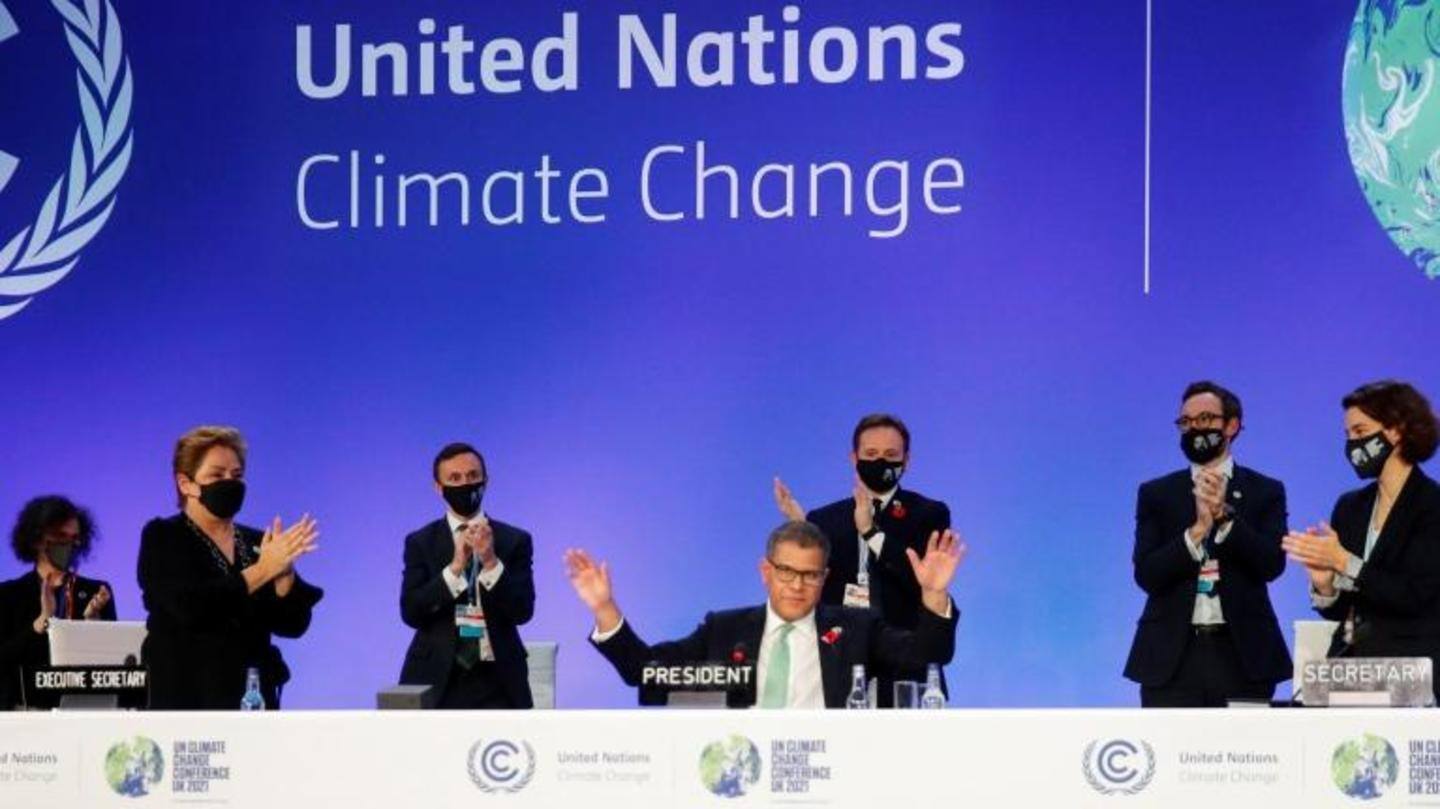
COP26: New global climate deal struck; India's coal pushback accepted
What's the story
A new deal to tackle climate change has been struck at the COP26 Summit in Glasgow after its extra time plenary concluded on Saturday.
Notably, India had made a successful intervention at the climate change conference that led to the revision of a clause that asked to "phase out" Fossil fuels.
The term was later changed to "phase down."
Context
Why does it matter?
The Glasgow Climate Pact has been accepted by nearly 200 countries.
This is the first-ever climate deal that explicitly targets fossil fuel, mainly coal, as the key contributor to global warming.
It calls for more urgent emission cuts and promises more financial assistance for developing countries to help them adapt to climate impacts.
The deal pledges to limit global warming to 1.5 degrees Celsius.
Details
Coal-reliant nations lobbed last-minute objections
India objected to a certain clause in the draft agreement that called for the "phase-out" of coal-fired power.
India's objection was also backed by China and other coal-dependent developing nations.
The clause was amended last minute to ask countries to reduce coal use instead of making it zero after talks between the envoys of China, India, the United States, and the European Union.
India
'India becoming voice of developing countries'
The revision reflects the "national circumstances of emerging economies," India's Environment Minister Bhupender Yadav told Reuters.
He highlighted that the pact had "singled out" coal but kept quiet about oil and natural gas.
"We are becoming the voice of the developing countries," he continued.
"We made our effort to make a consensus that is reasonable for developing countries and reasonable for climate justice."
Objection
Targeting sectors uncalled for: Environment Minister
Earlier at the summit, Yadav had questioned whether it is viable for developing countries to "phase out" coal and other fossil fuels when they "have still to deal with their development agendas and poverty eradication."
Fossil fuels have enabled parts of the world to attain high levels of wealth and well-being, and targeting any particular sector is uncalled for, he had said.
Quote
'Developing nations entitled to share of carbon budget'
Yadav further said the net-zero carbon emission target would be achieved by countries per national circumstances. "Developing countries have a right to their fair share of the global carbon budget and are entitled to the responsible use of fossil fuels within this scope," he said.
Criticism
Revised pact leaves many unhappy
Meanwhile, climate-vulnerable countries expressed their displeasure over the change in the language on fossil fuels.
Calling the change insufficiently transparent, Swiss Environment Minister Simonetta Sommaruga said, "We don't need to phase down...we need to phase out coal and fossil fuel subsidies."
"This will not move us closer to 1.5, but will make it more difficult to achieve," Sommaruga added.
Quote
COP26 President apologizes
Before slamming his gavel as a sign to finalize the pact, Alok Sharma, the President of COP26, apologized for dropping the original language on fossil fuel. "But we do have language on coal—and I think that is a start," he added.
Criticism
'Developed nations should take more onus'
Separately, developing countries also asked developed nations to take more responsibility as they contributed more to climate change.
Bolivia's chief negotiator Diego Pacheco accused developed nations of "transferring responsibility" to the rest of the world.
Developing countries also called for ensuring that developed nations meet their climate finance commitments. These funds are intended to help developing countries mitigate climate change.
UN
UN criteria not achieved
The United Nations had set three criteria to measure the success of the Glasgow talks. However, none of them were achieved.
These include pledges to cut carbon dioxide emissions in half by 2030, $100 billion in financial aid from rich nations to poor, and ensuring that half of that money went to helping the developing world adapt to the worst effects of climate change.
Other developments
UN chief, Thunberg criticize climate deal
UN Secretary-General Antonio Guterres said the pact was a "compromise, reflecting the interests, contradictions, and state of political will in the world today."
"It's an important step, but it's not enough," he said.
Climate activist Greta Thunberg dismissed Saturday's COP26 climate conference deal as "blah, blah, blah."
Those who welcomed the Glasgow pact also maintained that more work is required.